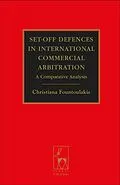The book deals with set-off in international arbitration proceedings. In these proceedings, set-off is frequently the tool relied upon to resist a claim. At the same time, the legal intricacies make it hard to use. The first part of the book provides a survey of set-off, including its definition, significance and functions. The second part offers a thorough comparative analysis of selected European laws of set-off and reveals the dramatic differences between them. The third and last part of the book deals with the problematic consequences of these differences and shows the limits and the inadequacy of the traditional choice-of-law doctrines. While demonstrating how to overcome the practical hurdles of the present situation, the third part also offers normative alternatives that should provide significant help in the adjudication of commercial disputes. This title is included in Bloomsbury Professional's International Arbitration online service.
Autorentext
Christiana Fountoulakis, Dr iur, Professor of Private Law and European Private Law, University of Fribourg, Switzerland, is an international sales law and choice-of-law specialist.
Inhalt
Introduction
1 Key Aspects of Set-off
I Definition
II Significance and Functions of Set-off
III Significance of Set-off in Modern Business Life
IV Modern Problems with Set-off
V Terminology
2 Set-off in a Comparative Survey
I Incipiencies: Roman Law
II Set-off in the Romanic Legal Systems
III Set-off in the Germanic Legal Systems
IV Set-off in England and English-based Jurisdictions
V Comparative Analysis
3 Set-off in the Conflict of Laws 1
I. Determination of the Applicable Law in International Arbitration
II Law-determination for Set-off in Classic Conflict of Laws
III Criteria for a Suitable Rule to Determine the Law Applicable to a Set-off in International Arbitration
IV Discussion of Classic Choice-of-Law Rules With Regard to Set-off
V Other Choice-of-Law Solutions in International Arbitration
VI Summary
4 Conclusions
5 Final Summary
